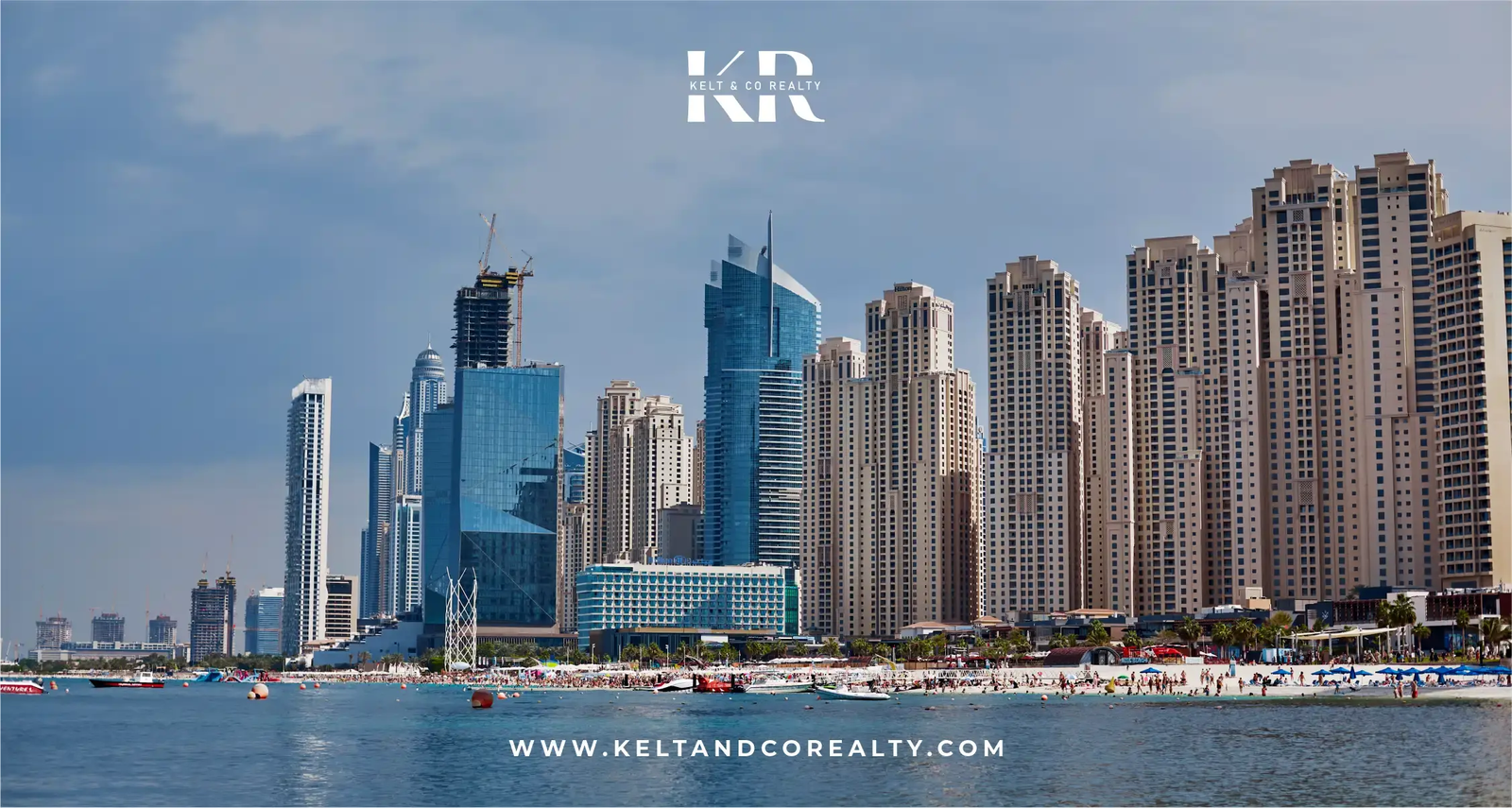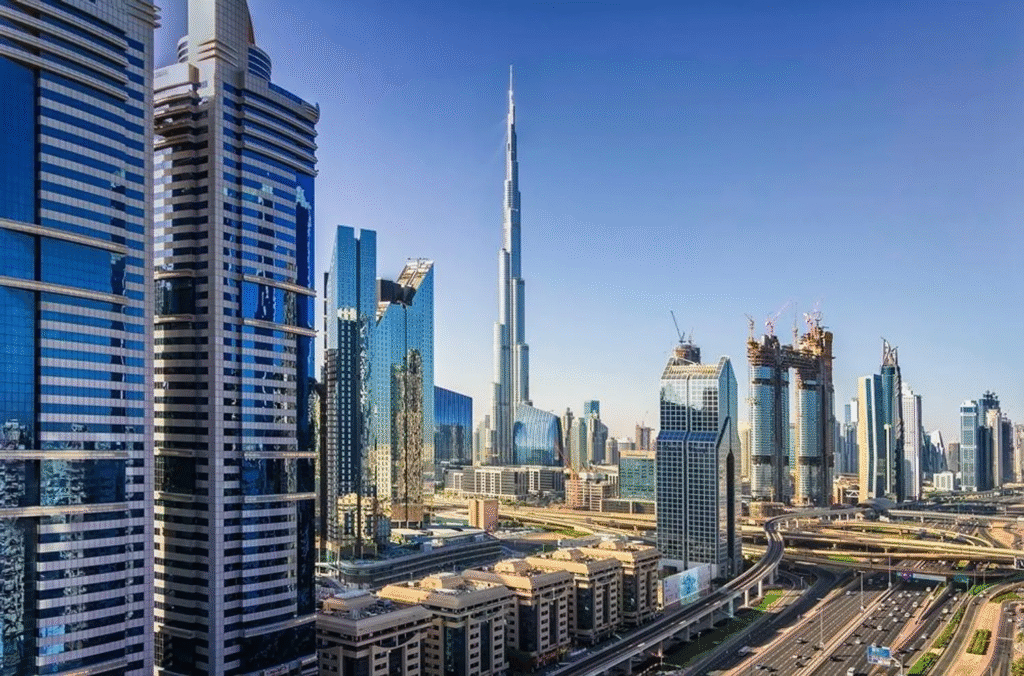
Picture yourself standing on your balcony, gazing at Dubai’s shimmering skyline or tranquil island waters, knowing your investment is growing in one of the world’s most dynamic real estate markets. In 2025, Dubai’s property scene is buzzing, with 96,000 transactions worth $87 billion in the first half, 58% driven by buyers from the UK, India, Russia, and China. Island and mainland properties, from Palm Jumeirah’s luxury villas to Jumeirah Village Circle’s affordable apartments, offer 100% freehold ownership, a dirham pegged to the U.S. dollar, and no personal income tax, capital gains tax, or annual property taxes.
With 6-10% rental yields and 6-15% price appreciation, both outperform London (2-4%) and New York (2-3%). Properties over $545,000 qualify for a 10-year Golden Visa, while smaller units grant 2-year residency. Fueled by 25 million tourists and a 4% population surge, projects like Palm Jebel Ali Villas, Dubai Creek Residences, Binghatti Heights, and Burj Al Arab Views spark the debate: island or mainland for better ROI? Navigating fees, VAT, and 2025 regulations will help you decide.
Island properties (Palm Jumeirah, Dubai Islands, The World Islands) offer waterfront exclusivity, while mainland areas (JVC, Downtown Dubai, Dubai Hills) provide affordability or urban vibrancy. Both have vacancy rates of 2-3% versus 7-10% globally. Island rentals yield $24,000-$150,000 annually on $400,000-$5 million properties, mainland $14,400-$96,000 on $150,000-$3 million properties, compared to $7,920-$90,000 elsewhere after taxes.
Zero capital gains tax saves $9,000-$300,000 on $45,000-$1.5 million profits, and no property taxes save $1,500-$50,000 yearly, unlike London’s council tax (up to 2%) or New York’s property tax (1-2%). Residential purchases skip 5% VAT ($7,500-$250,000), and the Golden Visa boosts appeal. Islands offer 8-15% price growth, mainland 6-12%, making ROI a close race.
Choosing feels like picking your path to Dubai’s wealth.
Both island and mainland properties impose no personal income tax, letting you keep every dirham, unlike the U.S. (up to 37%) or UK (up to 45%). A $400,000 Dubai Islands apartment yields $24,000-$36,000, saving $8,880-$16,200; a $150,000 JVC apartment yields $14,400-$21,600, saving $5,328-$9,720.
A $5 million Palm Jebel Ali villa yields $120,000-$150,000, saving $54,000-$67,500; a $3 million Dubai Hills villa yields $72,000-$96,000, saving $32,400-$43,200. Short-term rentals on islands, driven by 25 million tourists visiting JBR Beach, need a DTCM license ($408-$816), boosting yields by 10-20% ($2,400-$30,000). Mainland long-term leases in JVC and Dubai Hills, popular with families, need Ejari registration ($54-$136). Non-compliance risks fines up to $13,612, so licensing is key. Smart home systems maximize profits.
Tax-free rentals feel like a monthly boost to your dreams.
Both areas offer zero capital gains tax, letting you keep 100% of sale profits. Selling a $400,000 Dubai Islands apartment for $500,000 (25% appreciation) yields a $100,000 tax-free profit, saving $20,000-$28,000 versus London (20-28%) or New York (20-37%). A $5 million Palm Jebel Ali villa sold for $6.25 million yields a $1.25 million tax-free gain, saving $250,000-$350,000.
A $150,000 JVC apartment sold for $187,500 yields a $37,500 tax-free profit, saving $7,500-$10,500; a $3 million Dubai Hills villa sold for $3.6 million yields a $600,000 tax-free gain, saving $120,000-$168,000. Islands lead with 8-15% price growth, mainland offers 6-12%. A 4% DLD fee ($6,000-$200,000), often split, applies, but tax-free profits amplify returns.
Keeping every dirham feels like a financial celebration.
Unlike global markets, neither island nor mainland properties have annual property taxes, saving $1,500-$50,000 yearly on $150,000-$5 million properties versus London’s council tax ($3,000-$100,000) or New York’s property tax (1-2%). Island maintenance fees are $5,000-$25,000 (Palm Jebel Ali villas higher), covering marinas; mainland fees are $2,000-$20,000 (JVC lower), covering parks. A 5% municipality fee on rentals ($720-$7,500) applies, slightly higher on islands. These costs make ownership lighter than global counterparts.
No property taxes feel like a warm hug for your investment.
Residential purchases skip 5% VAT, saving $7,500-$250,000 on $150,000-$5 million properties, unlike commercial properties or the UK’s stamp duty (up to 12%, or $18,000-$600,000). Off-plan island purchases (e.g., Palm Jebel Ali) and mainland projects (e.g., JVC) incur 5% VAT on developer fees ($1,500-$100,000), recoverable via Federal Tax Authority (FTA) registration ($500-$1,000).
Short-term rental operators must register for VAT if revenue exceeds $102,041, charging 5% but claiming credits on DTCM fees ($408-$816). A $400,000 island apartment yielding $24,000-$36,000 incurs $1,200-$1,800 in VAT, with $400-$800 in credits; a $150,000 JVC apartment yielding $14,400-$21,600 incurs $720-$1,080, with $300-$600 in credits. Non-compliance risks fines up to $13,612, so records are crucial.
VAT exemptions feel like a clever lift for your profits.
The 4% DLD fee, typically split, applies: $6,000 for a $150,000 JVC apartment, $200,000 for a $5 million Palm Jebel Ali villa. Gift transfers to family or shareholders reduce DLD to 0.125%, saving $5,812-$193,750. For example, gifting a $5 million villa cuts DLD from $200,000 to $6,250. Title deed issuance costs $136-$272, requiring DLD registration. Broker fees, typically 2% ($3,000-$100,000), may be waived for off-plan projects. Mortgage registration (0.25% of the loan, or $375-$12,500) and valuation fees ($680-$1,360) apply for financed deals. The 2025 Oqood system ensures escrow compliance for off-plan purchases, protecting your investment.
Title deeds feel like the key to your Dubai haven.
The 9% corporate tax, introduced in 2023, applies to businesses with profits over $102,110. A company leasing a $150,000 JVC apartment yielding $14,400-$21,600 faces a 9% tax ($1,296-$1,944), reducing net income to $13,104-$19,656. A $5 million island villa yielding $120,000-$150,000 incurs $10,800-$13,500 in tax. Qualified Free Zone Person (QFZP) status in areas like Dubai Multi Commodities Centre (DMCC) avoids this, saving $3,060-$36,000, with setup costs of $2,000-$5,000. Small business relief waives corporate tax for revenues under $816,000 until December 31, 2026. Individual ownership skips this tax, ideal for most investors.
Corporate tax feels like a wave you can easily navigate.
The Domestic Minimum Top-up Tax (DMTT), effective January 1, 2025, imposes a 15% tax on multinationals with revenues over €750 million ($793 million). Individual investors and smaller entities are unaffected, and QFZP status avoids DMTT, saving $3,060-$36,000. Cabinet Decision No. 34 refines Qualifying Investment Fund (QIF) rules, exempting corporate tax if real estate income is below 10%. A QIF earning $1 million, with $100,000 from rentals, faces 9% tax ($8,100) on 90% ($900,000). A July 2025 policy allows corporate tax deductions on fair market value depreciation, saving $1,091-$9,000 annually for a $1 million property revalued at $1.25 million.
New rules feel like a puzzle with profitable solutions.
Palm Jebel Ali Villas ($2 million-$5 million) offer luxury villas with 6-8% yields and 10-15% price growth, boasting 80-85% occupancy. A $2 million villa yields $80,000-$120,000 tax-free, saving $36,000-$48,000. Selling for $2.5 million yields a $500,000 tax-free profit, saving $100,000-$140,000. No property taxes save $20,000-$50,000, and VAT exemption saves $100,000 (5% VAT on developer fees, $20,000-$50,000). Maintenance fees are $15,000-$25,000, with a 5% municipality fee ($4,000-$6,000). QFZP saves $12,240-$36,000. U.S. investors deduct depreciation ($36,364-$90,909), saving up to $31,818. Golden Visa eligibility draws elite buyers.
Palm Jebel Ali feels like a prestigious coastal gem.
Dubai Creek Residences ($700,000-$2 million) offers apartments with 7-10% yields and 7-12% price growth, near retail hubs. A $700,000 apartment yields $42,000-$60,000 tax-free, saving $15,540-$27,000. Selling for $875,000 yields a $175,000 tax-free profit, saving $35,000-$49,000. No property taxes save $7,000-$20,000, and VAT exemption saves $35,000 (5% VAT on developer fees, $7,000-$20,000). Maintenance fees are $8,000-$12,000, with a 5% municipality fee ($2,100-$3,000). QFZP saves $6,120-$19,440. U.S. investors deduct depreciation ($12,727-$36,364), saving up to $12,727. Golden Visa eligibility boosts appeal.
Dubai Creek feels like a vibrant waterfront haven.

Binghatti Heights ($150,000-$400,000) offers apartments with 7-10% yields and 6-10% price growth, near Circle Mall. A $150,000 apartment yields $14,400-$21,600 tax-free, saving $5,328-$9,720. Selling for $180,000 yields a $30,000 tax-free profit, saving $6,000-$8,400. No property taxes save $1,500-$4,000, and VAT exemption saves $7,500. Maintenance fees are $2,000-$5,000, with a 5% municipality fee ($720-$1,080). QFZP saves $3,060-$6,120. U.S. investors deduct depreciation ($2,727-$7,273), saving up to $2,545. Its affordability attracts young expats.
JVC feels like a budget-friendly community hub.
Burj Al Arab Views ($500,000-$1.5 million) offers apartments with 7-10% yields and 7-12% price growth, near Burj Khalifa. A $500,000 apartment yields $36,000-$54,000 tax-free, saving $13,320-$24,300. Selling for $625,000 yields a $125,000 tax-free profit, saving $25,000-$35,000. No property taxes save $5,000-$15,000, and VAT exemption saves $25,000. Maintenance fees are $7,000-$12,000, with a 5% municipality fee ($1,800-$2,700). QFZP saves $6,120-$19,440. U.S. investors deduct depreciation ($9,091-$27,273), saving up to $9,545. Golden Visa eligibility draws professionals.
Business Bay feels like a dynamic urban retreat.
Price Range: Islands ($400,000-$5 million) target mid-to-luxury buyers; mainland ($150,000-$3 million) offers affordability to upscale options.
Rental Yields: Islands and mainland both deliver 6-10%, with islands slightly higher (7-10% in Dubai Creek) due to tourist demand. Short-term rentals boost island yields by 10-20% ($2,400-$30,000), mainland by 10-15% ($1,440-$14,400).
Price Appreciation: Islands lead at 8-15% (Palm Jebel Ali at 10-15%), mainland at 6-12% (Dubai Hills at 8-12%).
Lifestyle: Islands offer waterfront exclusivity; mainland provides urban or suburban community vibes.
Amenities: Islands boast beaches and marinas; mainland offers schools, malls, and metro access.
Costs: Island maintenance ($5,000-$25,000) and DLD fees ($16,000-$200,000) are higher than mainland ($2,000-$20,000; $6,000-$120,000).
ROI Verdict: Islands yield 8-12% ROI, driven by higher appreciation; mainland offers 8-12% ROI with lower entry costs, ideal for budget buyers.
Islands shine for prestige and growth; mainland wins for affordability and flexibility.
For individuals: First, hold properties personally to avoid corporate taxes, saving $3,060-$36,000. Second, negotiate DLD fee splits, saving $3,000-$100,000. Third, use gift transfers to reduce DLD to 0.125%, saving $5,812-$193,750. Fourth, recover 5% VAT on developer fees via FTA registration ($500-$1,000). Fifth, leverage double taxation treaties with 130+ countries, saving $5,328-$67,500.
Sixth, U.S. investors deduct depreciation ($2,727-$90,909), saving up to $31,818. For corporates: Secure QFZP status, keep QIF income below 10%, and claim depreciation deductions.
read more: Best Family-Friendly Communities in Dubai to Buy Property
